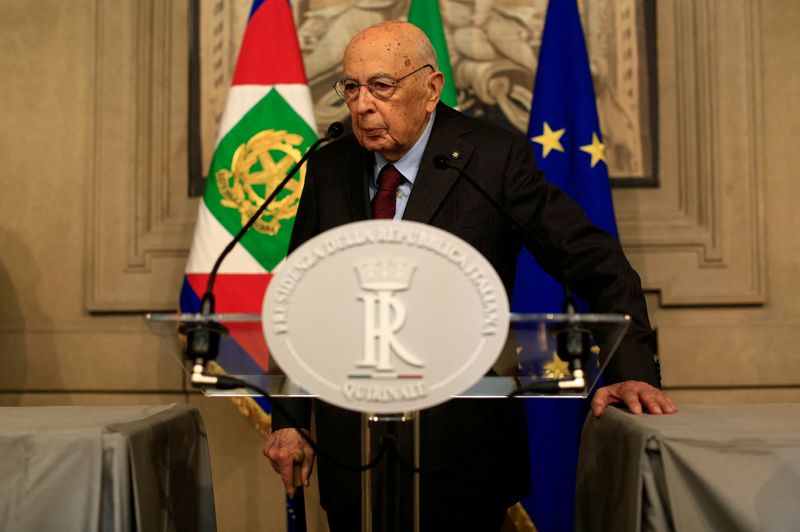By Steve Scherer
ROME (Reuters) - Giorgio Napolitano, who died on Friday aged 98, was one of modern Italy's most important presidents as he steered the country away from the brink of default during Europe's debt crisis and later out of political paralysis.
A career politician who joined the Italian Communist Party (PCI) in 1945, the mild-mannered, bespectacled Napolitano was picked by parliament to become Italy's 11th president in 2006 and re-elected for a then-unprecedented second term seven years later.
He stepped down in 2015, midway through his mandate, saying that, at 89, he was too old to carry on.
Napolitano forged a close relationship with the late Pope Benedict XVI and was one of the few people to have been warned in advance of Benedict's shock resignation in February 2013.
Italian presidents had mostly been little more than ceremonial figures, ribbon-cutters and authors of patriotic speeches, but some credit Napolitano, affectionately known as "King George", with saving the country from financial ruin, while critics said he overstepped his bounds.
In November 2011, at the height of the euro zone debt crisis, then-prime minister Silvio Berlusconi resigned after losing parliamentary support, leaving Italy teetering on the verge of defaulting on its debts.
Napolitano quickly named Mario Monti, a former European Commission technocrat, to impose deep spending cuts and lead the country through the turmoil.
Three years later, after former U.S. Treasury Secretary Timothy Geithner said in a book there had been a "scheme" to replace Berlusconi, Napolitano was accused of conniving with German Chancellor Angela Merkel to depose the billionaire media mogul, an accusation the president denied.
The anti-establishment 5-Star Movement, casting itself as the defender of political orthodoxy, accused Napolitano of exceeding his constitutional powers, calling an impeachment vote that parliament rejected.
In 2013, with his mandate expired, Napolitano had cleaned out his office and was looking forward to retirement when party leaders - including Berlusconi - pleaded with him to accept a second term to help overcome parliamentary divisions.
He acquiesced and days later, because no clear winner had emerged from a parliamentary election held a month before, Napolitano installed a right-left grand coalition under centre-left politician Enrico Letta, bringing the tumult to an end.
COMMUNIST
Napolitano, born and raised in the southern city of Naples, was an active anti-fascist as a student, according to his official profile, before joining the PCI.
He spent more than four decades in parliament after first being elected in 1953, initially sticking close to the official Communist Party line, praising the Soviet Union's 1956 invasion of Hungary.
But he was always seen to be on the reformist wing of the movement and in 1978 became the first high-ranking leader of a communist party to visit the United States.
The PCI, once the most influential leftist force in western Europe, was dissolved in 1991 after the collapse of the Soviet Union. Moderate elements formed the Democratic Party of the Left (PDS), with Napolitano striving to position it as a mainstream, pro-Western group.
"We must resist the temptation of once again turning America into the traditional bogeyman of the left," he said in 1991, defending U.S. actions in the first Gulf War and earning a chorus of jeers and hisses from PDS members.
He served as president of the lower house of parliament from 1992 to 1994, and was interior minister under prime minister Romano Prodi from 1996-98.
A tall man with a courteous demeanour, Napolitano frequently showed his physical fragility and emotions in the latter years of his presidency, tearing up nostalgically during speeches.

After his retirement Napolitano continued attending Senate sittings when his health permitted. Last year he skipped the inaugural session of the upper house, which he had the right to chair as the most senior member, due to his frail condition.
He is survived by his wife, Clio, who was often seen by his side during official state visits and events, two sons, Giovanni and Giulio, and grandchildren.